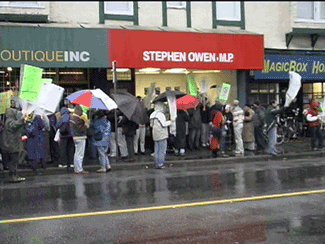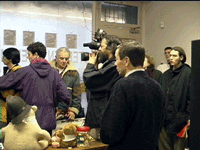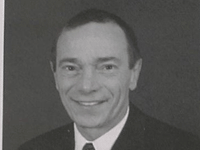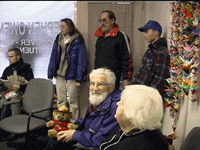

 |
 |
| 'Teddy Bear' Occupation Wins Concessions |
Bill C-36 Protestors End Occupation of Liberal MP's Office |
 |
|
Update from Deacon Dave from www.vancouver.indymedia.org 17/12/01 Hate Bill C-36? Wait until you meet its brother by Naomi Klein |
SATURDAY DECEMBER 15, VANCOUVER: |
 |
|
|
|
 |
Teddy Bear Brigade Occupation 3 - Saturday December 15, 2001 RT: 2:54 |
 |
Teddy Protest 3 Real Video BROADBAND* |
FRIDAY DECEMBER 14, VANCOUVER: |
The Teddy Bear Brigade's occupation of MP Stephen Owen's office continued in its third day today. Many supporters came by to sit in or picket for a few hours or to bring food and drink. Brigade Spokesperson Dave Havard, an Anglican Church Deacon, was on the phone with MP Stephen Owen, who was in Ottawa. |
 Deacon Dave
|
 Stephen Owen |
Owen promised to meet with the protestors at 10:00 am Saturday December 15, and asked that the occupation end and the brigade leave his office at 5:00 pm Friday. Apparently he was concerned with the extra cost he would incur from having to hire security from 5:00 pm Friday till Saturday morning. |
A large mobilization is expected outside Owen's office for the promised meeting at 10:00 am, Saturday December 15. The address is 5315 West Boulevard in Vancouver, or Arbutus and 37th Avenue. |
Teddy Bear Brigade Occupation 2 - Friday December 14, 2001 - RT: 1:30 |
 |
Teddy Protest 2 Real Video BROADBAND* |
WEDNESDAY DECEMBER 13, VANCOUVER: |
The Teddy Bear Brigade, a diverse group of concerned citizens are protesting Bill C-36 - the Federal Liberal Government's so-called 'anti-terrorist' legislation - by occupying the constituency offices of Liberal MP Stephen Owens. He is Parliamentary Assistant to Justice Minister Anne McLennan and played an important role in drafting the bill. |
Bill C-36 has passed through Parliament with little debate and is now before the Senate. In concert with pending Bills C-35 and C-42 it represent the most sweeping assualt on civil rights and liberty in Canadian history. If given Royal Assent these bills could be used to label peaceful protestors as terrorists and further criminalize dissent in this country. |
 |
Teddy Bear Brigade Occupation 1 - Wednesday December 12, 2001RT: 1:55 |
 |
Teddy Protest 1 Real Video BROADBAND* |
| New to web video? You need | to view these videos. |
Having trouble? Go to Real
Player Tips and Tricks or RealNetworks Support & Service or contact [email protected] |
Update on the occupation of
|
Order tapes | About working TV | Contact us | Links |

|